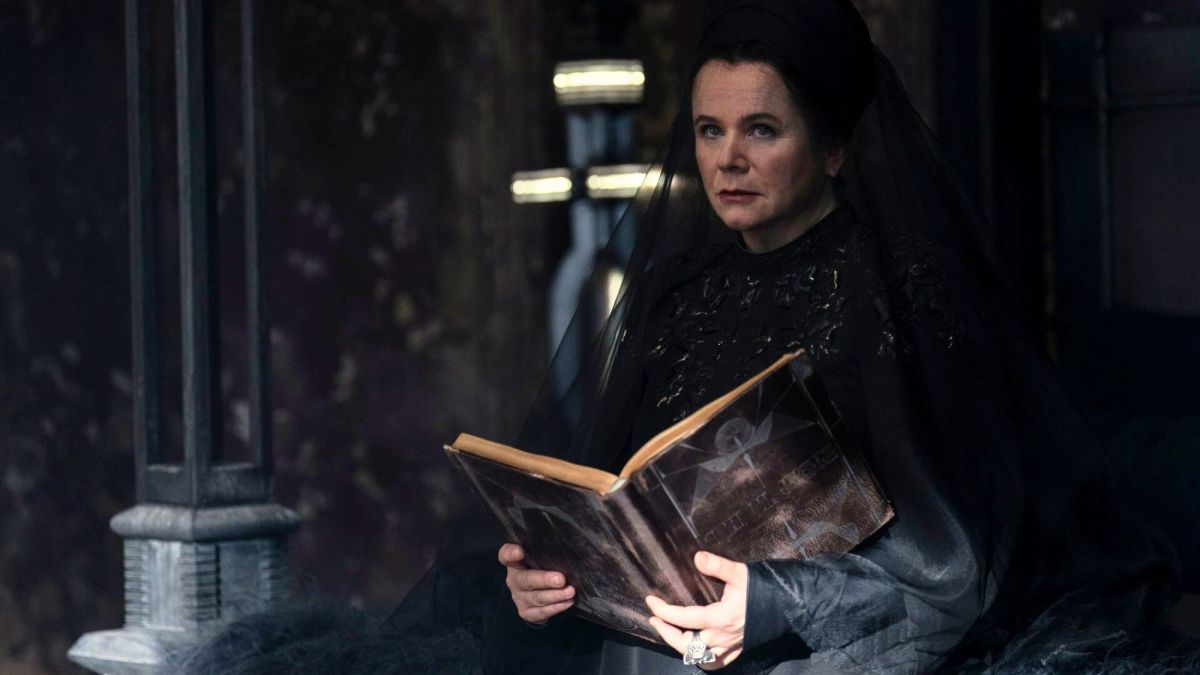Warning
This review contains spoilers for DUNE: PROPHECY episode 4
Dune: Prophecy continues its descent into the treacherous world of Arrakis with its fourth episode, “Twice Born.” While the episode promises explosive revelations and political maneuvering, it stumbles in its execution, leaving viewers with a sense of dissatisfaction.
Dune: Prophecy
The episode opens with a chilling sequence where the Bene Gesserit acolytes are plagued by a shared nightmare, a vision of self-inflicted violence that sets a foreboding tone. This unsettling dream serves as a prelude to the episode’s central plot: Valya Harkonnen’s audacious scheme to elevate House Harkonnen within the Landsraad.
Valya, played with chilling composure by Emily Watson, manipulates the political landscape with the help of the Truthsayers, subtly influencing key members of the Landsraad to suspect Emperor Javicco Corrino (Mark Strong) of assassinating Pruwet Richese. This suspicion leads to the promotion of House Harkonnen, making them the prime investigators in the alleged assassination plot.
While the scene is visually impressive, with director Richard J. Lewis expertly capturing the grandeur of the Landsraad and the stark contrast between the black-clad Bene Gesserit and the ornately dressed nobles, the plot itself feels disappointingly transparent. Valya’s machinations are laid bare, leaving little room for intrigue or suspense.
This lack of subtlety has been a recurring issue in Dune: Prophecy. The series often relies on characters explicitly stating their plans and motivations, undermining any sense of mystery or cunning. This approach contrasts sharply with the source material, where political maneuvering and hidden agendas were the lifeblood of the narrative.
The dialogue, penned by Kevin Lau & Suzanne Wrubel, further exacerbates this issue. The conversations often feel shallow, lacking the depth and complexity that one would expect from a series set in the Dune universe. The show seems content with rehashing familiar themes of power struggles and betrayals without offering any fresh perspectives or insights.
The episode briefly touches upon the internal struggles of the Bene Gesserit, with Tula Harkonnen (Olivia Williams) guiding the acolytes through a trance to interpret their shared nightmare. This scene showcases the show’s potential for delving into the psychological and spiritual aspects of the Bene Gesserit order. However, the momentum is quickly lost as the scene is followed by a rather mundane conversation between Tula and Sister Avila (Barbara Marten), reducing the profound imagery of the dream to a simplistic “something scary is out there” conclusion.
Dune: Prophecy heavily relies on the mystery surrounding Desmond Hart (Travis Fimmel) to drive its narrative. However, the show’s handling of this enigmatic character leaves much to be desired. The questions surrounding Hart’s powers and origins are either reduced to obvious inquiries or bogged down in convoluted lore from the expanded Dune universe. The episode’s revelations about Lila’s (Chloe Lea) resurrection and the presence of a Tleilaxu face dancer within House Harkonnen fail to generate any genuine surprise or engagement.
Amidst the shortcomings of the episode, Travis Fimmel’s portrayal of Desmond Hart emerges as a highlight. The climax of “Twice Born” takes place at the Landsraad, where Harrow Harkonnen (Edward Davis) attempts to execute Valya’s plan by accusing House Corrino of murder. Simultaneously, Keiran Atreides (Chris Mason) prepares to unleash his devastating attack.
However, Desmond Hart disrupts the proceedings, seizing control with a theatrical flourish. He confesses to killing Pruwet Richese for utilizing a thinking machine and proceeds to expose members of the resistance. With the Emperor’s consent, Hart unleashes his destructive powers, eliminating the resistance leaders and the treacherous members of the Landsraad.
Fimmel’s performance is deliberately over-the-top, filled with dramatic pauses, exaggerated gestures, and a sonorous voice that commands attention. This theatricality, while seemingly out of place, becomes a captivating element in a show that often feels too restrained. Fimmel’s Hart is a force of chaos, a wildcard in a world of carefully calculated moves.
Dune: Prophecy Episode 4 “Twice Born” exemplifies the series’ central conflict: it strives to be a show about intricate plots and hidden agendas, but it often falls into the trap of simplistic storytelling and obvious dialogue. While the episode boasts impressive visuals and strong performances from its cast, it fails to deliver a truly compelling narrative.





